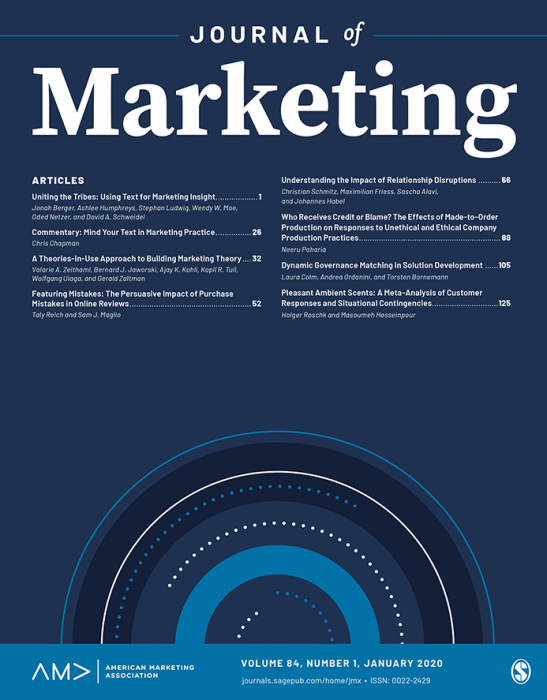EXPRESS: Breaking Up to Move Forward: The Value Gains of Alliance Terminations
IF 10.4
1区 管理学
Q1 BUSINESS
引用次数: 0
Abstract
Prior alliance research in marketing has largely focused on factors enhancing alliance stability. Yet also alliance terminations can be valuable. They are intricately linked with firms’ strategies to (re)allocate resources to create financial value. The basic premise of this study is that an alliance termination increases firm value when investors interpret it as the firm’s intention to reallocate resources towards more promising market opportunities. The key question is how investors arrive at that interpretation. The prior literature suggests that the diversity of a firm’s alliance portfolio informs investors about its resource (re)allocation strategy. This argument relies on three assumptions: (1) firms face uncertainty, (2) resources invested in the terminated alliance are redeployable, and (3) the diverse alliance portfolio offers resource reallocation opportunities. These assumptions form the basis for the development of a contingency framework. Moderators are identified to capture (1) firms’ competitive environment and exposure to macroeconomic risk, (2) the fungible nature versus alliance-specificity of resources invested in the terminated alliance, and (3) efficiency and overlap with the other alliances in the portfolio. An event study of 427 firm-alliance termination announcements during 1985-2020 supports the predictions. The combined findings shed new light on alliance terminations, contributing to marketing theory and practice.快讯:分拆前进:联盟终止的价值收益
以往市场营销领域的联盟研究主要集中在提高联盟稳定性的因素上。然而,联盟的终止也可能是有价值的。它们与企业(重新)配置资源以创造财务价值的战略有着错综复杂的联系。本研究的基本前提是,当投资者将联盟终止解释为企业有意将资源重新配置到更有前景的市场机会时,联盟终止会增加企业价值。关键问题是投资者如何得出这样的解释。先前的文献表明,企业联盟投资组合的多样性告知投资者其资源(再)配置策略。这一论点基于三个假设:(1)企业面临不确定性;(2)投资于终止联盟的资源是可重新部署的;(3)多样化的联盟组合提供了资源重新配置的机会。这些假设构成了制定应急框架的基础。我们确定了调节因子来捕捉(1)企业的竞争环境和宏观经济风险敞口,(2)投资于终止联盟的资源的可替代性与联盟特异性,以及(3)投资组合中其他联盟的效率和重叠。一项对1985-2020年间427家公司联盟终止公告的事件研究支持了这一预测。综合研究结果为联盟终止提供了新的视角,对市场营销理论和实践做出了贡献。
本文章由计算机程序翻译,如有差异,请以英文原文为准。
求助全文
约1分钟内获得全文
求助全文
来源期刊

Journal of Marketing
BUSINESS-
CiteScore
24.10
自引率
5.40%
发文量
49
期刊介绍:
Founded in 1936,the Journal of Marketing (JM) serves as a premier outlet for substantive research in marketing. JM is dedicated to developing and disseminating knowledge about real-world marketing questions, catering to scholars, educators, managers, policy makers, consumers, and other global societal stakeholders. Over the years,JM has played a crucial role in shaping the content and boundaries of the marketing discipline.
 求助内容:
求助内容: 应助结果提醒方式:
应助结果提醒方式:


